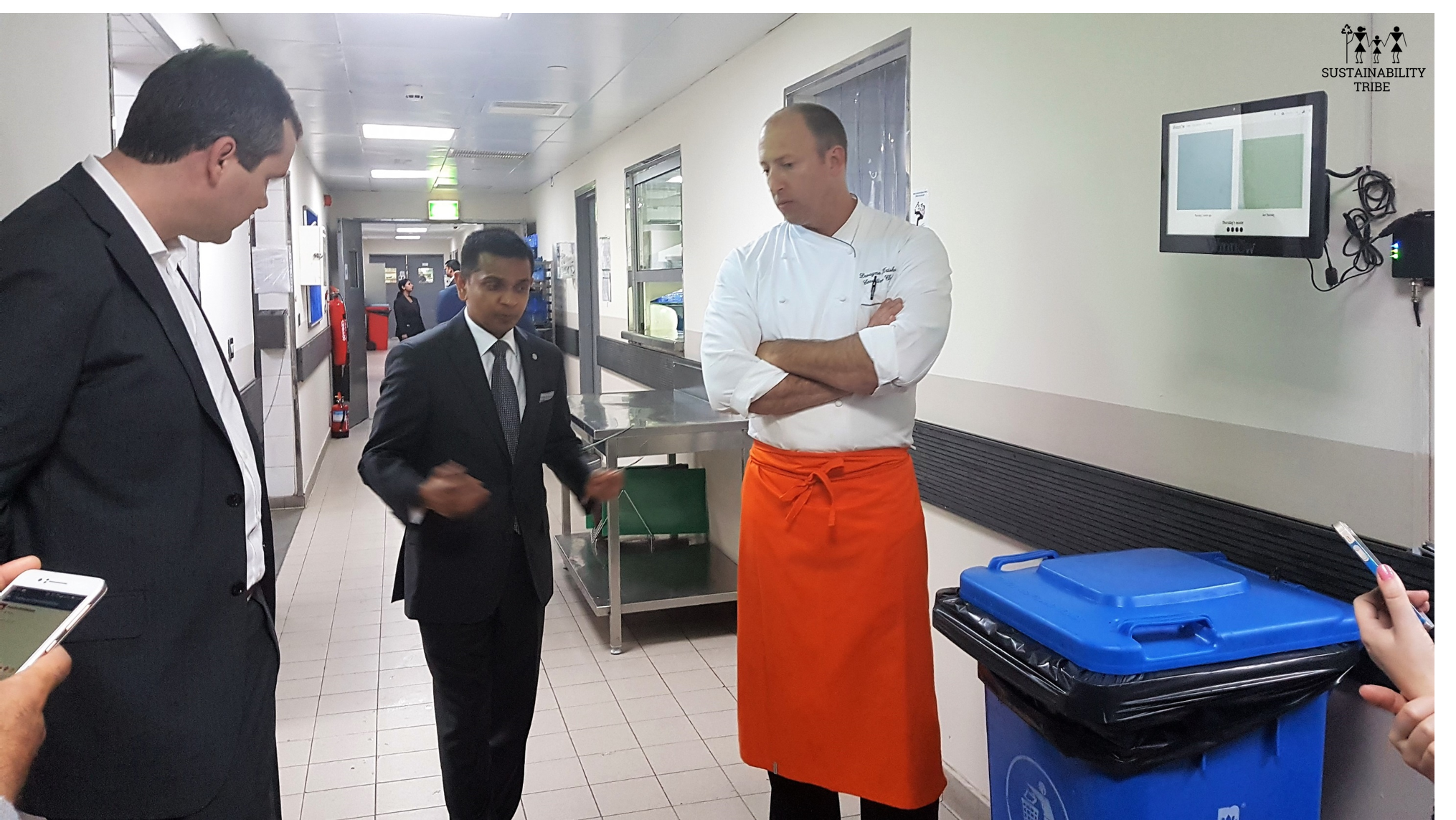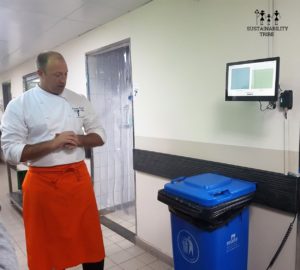Every year worldwide 1.3 billion tonnes of food is wasted! To translate that in monitory terms, 1 trillion US $ are lost in food waste every year! Recently at World Government Summit, Executive Secretary of United Nations Framework Convention on Climate Change quoted ‘If food waste were a country, it would be the world’s third-largest emitter of carbon dioxide (CO2)’
Food security and climate is the world’s top 3rd important topic which needs urgent attention. If we look at local food waste statistics it’s even more astonishing. An average person in UAE generates 5.4kg of waste a day. According to Dubai carbon, roughly 38% of the food prepared in Dubai is wasted every day, this figure jumps to 60% during the holy month of Ramadan. 40% of household waste bins are filled with food waste if you have doubt just look at your bin!
Centre for Waste Management, Abu Dhabi found out through a study conducted in 2009, 33 % of Abu Dhabi’s waste comprises food waste.
Can you imagine the environmental impact of Food waste? 300 million barrels of oil and 25 % of all freshwater is used to produce the food that is wasted globally. 198 million hectares of land is used to produce food that is lost or wasted each year, the size of Mexico. According to the UN, even if just a quarter of the food currently lost or wasted across the world could be saved, it would be enough to feed 870 million hungry people in the world.
These figures are much higher for UAE, as most of UAE’s food comes from outside, so there is much more carbon footprint involved in the food that we eat for its additional transport. The fresh food from UAE consumes more resources than most of the world as we don’t have natural water resource in UAE, so water used for farming here is more energy consuming than rest of the world.
When we are wasting food, we are also wasting resources like water, land, energy consumed in producing that food, packaging, transporting as well as storing that food. Plus the wasted food ends up in a landfill and it creates methane gas. Methane emissions from landfills represent the largest source of GHG emissions from the entire waste sector, contributing around 700 metric tonnes of CO2 equivalent per year.
This year UAE’s PM H.H. Sheikh Mohammed Al Maktoum announced Year of Giving and launched UAE Food Bank. The food bank will collect excess food from hotels, supermarkets, restaurants, and farms. This food will be stored, packaged and distributed to those in need; inedible food will be recycled for use as fertilizers, chemicals, and medicinal research. The food bank will help Dubai to achieve it’s ambitious Zero Food Waste goal.

Marc Zornes, GM Nishan Silva, Chef Krisko
But some months before the UAE government initiated the program to tackle food waste, Pullman Dubai City Center installed an innovative technology by Winnow Solutions to reduce their food waste. Since the technology installation in June 2016, Pullman DCC has saved USD $20,000 by reducing the cost of food purchased by 4%.
Recently I was invited to take a sneak peek behind scenes of Medley restaurant at Pullman DCC. Where Founder of Winnow technology Marc Zornes and Pullman’s executive chef Dwayne Krisko along with Pulman DCC’s GM Nishan Silva explained how Winnow technology works to reduce food waste.
This technology basically helps to record food waste, analyses the data and generates reports and food waste tracking sheets. Chef Dwayne Krisko showed us a demonstration in the kitchen where the Winnow technology is installed. The system comprises a set of digital scales and tablet which is connected to the cloud making it quick and easy for chefs to measure food waste. Every time the wasted food is thrown in the bin, the staff has to select a few options on the screen above and food waste is measured. Chef Krisko told us, it needed some training of staff at the start but it wasn’t difficult to adopt in our routine as it takes only a few minutes. Through Winnows Food Waste Reduction Solution Pullman DCC is able to save an estimated 5.6 tons of food from landfill yearly and an equivalent of 14,000 plated meals.
The technology is self-calibrated and doesn’t need much maintenance after installation. Chef Dwayne Krisko told us they need to change around 4 bags for the bin in a day. Very soon they are going to install a screen at the entrance of a restaurant where guest can read about this technology and might get inspired to reduce food waste while having a meal in the restaurant. It will definitely be useful in educating guests and help spread awareness about food waste.

Chef Dwayne Krisko
Teams receive daily reports highlighting where waste is occurring. The data is a good indicator of food behavior of guests, changing demands and choices, mostly depend on the time of the week or year and also the cultural background of the guests. Accordingly, the portion sizes and the even menu is modified to cut back food waste. The food waste insight help kitchen to make their operations more efficient and sustainable. This ongoing procedure has shown great achievement through numbers achieved for food waste. Have a look at their case study in this video.
During the discussion, GM Nishan Silva mentioned from Hotelier point of view that in UAE people give attention to reduce the cost of air conditioning and water use as we see the resource consumption converted in bills but that is not the case with food waste. Agreeing his point Winnow’s Founder Marc Zornes added food waste is a hidden cost, as you don’t get bills for food waste. But ‘What get’s measured get’s managed’ and this is where innovative technologies like winnows solutions help businesses to manage food waste.
Marc also added, the biggest challenge they face is, businesses don’t accept that they waste food, mostly because they are unaware. Most of the food is wasted before cooking as a result of excess shopping. So to manage food waste, food shopping has to be managed. Once the data on food waste is available it’s easy to control the cost of food shopping in turn easy to manage food waste.
Winnow technology is installed in 20 countries within its 3 years since the start of business. Their founder Marc stated that their main goal, for now, is to develop analytics and focus on helping chefs. Winnows customers typically save 3 to 8 % on food cost, he added, tackling food waste is a huge opportunity for the hospitality sector and we believe that Winnow has application in virtually every professional kitchen across the UAE.
Read here a candid interview with Winnow’s co-founder Marc Zornes.
GM Nishal Silva told us, As part of Accor Hotels social movement to tackle food waste in line with the Group’s sustainable development program ‘Planet 21,’ Pullman implemented the Winnow Food Waste Management program as a pilot hotel. the program has witnessed a reduction in food waste by almost 70% in the initial months. With such outstanding results, Accor Hotels are now looking to roll out the program gradually to all their UAE properties by 2018.
Accor Hotels have set ambitious sustainability goals which they are planning to achieve through their hospitality properties worldwide by 2020. To name a few, Reducing food waste by 30% by 2020 across all hotels. Plant 10 million trees via ‘plant for the planet’ program by 2021. Achieving 100% of low carbon buildings including new, renovated and owned or leased hotels by 2020. Here is the link to their Planet 21, sustainable development program, worth a good read! Accor Hotels are definitely creating their unique place in sustainable tourism, going beyond those basic ‘green hotel policies’, where the limited focus is given to only reusing linens and green housekeeping! Whereas Accor hotels are actually taking a step based on sustainability principles to provide responsible travelers around the world great sustainable accommodation options without compromising comfort.
While giving emphasis on healthy, sustainable food and urban farming in their properties worldwide, Accor Hotels have set a great example of reducing food waste in UAE through Pullman Dubai Creek.
You might like to read more about Sustainability Industry Updates here. If you want to reduce food waste at home, try our Empty fridge Day.

Amruta Kshemkalyani, an expert sustainability professional turned social entrepreneur, is the founder of the Sustainability Tribe, AK Sustainability
Read More >>
Copyright 2025 © Sustainability Tribe, Registered under 'Sustainability Tribe Marketing Management' in the U.A.E., Design by LBM INFOTECH
Great post, honestly, I never thinked about food like those information. Thanks to you I will shopping more considered.
Hi IwoN(IT)KA glad to give you some new information! You might like to read about sustainable food in Green Living section.
So much inspiring information in this post Amruta, great read! X
Thank you Shea!
What a great initiative by this restaurant, and the idea of attaching the screen at the entrance to inspire guests is very much needed. There are definitely times when I over shop and I feel so guilty when the food goes bad without me even having taken a bite out of it. Thank you for the reminder and I hope the community as a whole can decrease or eradicate food wastage completely.
I am glad you liked the article Zeyna! Yes if we take actions and start individual efforts, we all together can eradicate food waste!
Great post and initiative by Pullman to utilize such great technology for a better use, Amruta. So much looking forward to food banks this year, honestly and hope we call get more cautious about the food and other things we are splurging without a thought.
Tasneem, yes indeed it’s amazing initiative! Yes we all need to take efforts on personal level to reduce food waste!
Great initiative! Food wastage makes me really unhappy.